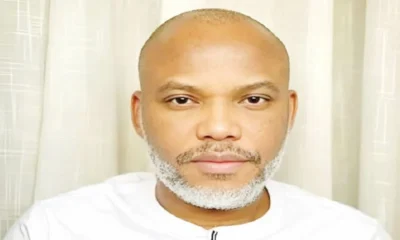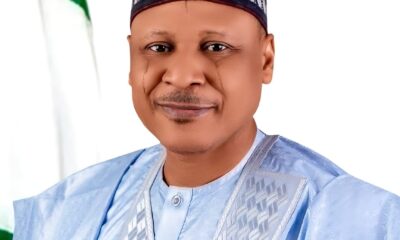News
Safety metrics are emphatically stronger when Autopilot is engaged than when not engaged – Tesla Says.

We at Tesla believe that we have a moral obligation to continue improving our already best-in-class safety systems. At the same time, we also believe it is morally indefensible not to make these systems available to a wider set of consumers, given the incontrovertible data that shows it is saving lives and preventing injury.
Regulators around the globe have a duty to protect consumers, and the Tesla team looks forward to continuing our work with them towards our common goal of eliminating as many deaths and injuries as possible on our roadways.
Below are some important facts, context and background.
Background
1. Safety metrics are emphatically stronger when Autopilot is engaged than when not engaged.
a. In the 4th quarter of 2022, we recorded one crash for every 4.85 million miles driven in which drivers were using Autopilot technology. For drivers who were not using Autopilot technology, we recorded one crash for every 1.40 million miles driven. By comparison, the most recent data available from NHTSA and FHWA (from 2021) shows that in the United States there was an automobile crash approximately every 652,000 miles.
b. The data is clear: The more automation technology offered to support the driver, the safer the driver and other road users. Anecdotes from the WaPo article come from plaintiff attorneys—cases involving significant driver misuse—and are not a substitute for rigorous analysis and billions of miles of data.
c. Recent Data continues this trend and is even more compelling. Autopilot is ~10X safer than US average and ~5X safer than a Tesla with no AP tech enabled. More detailed information will be publicly available in the near future.
2. Autopilot features, including Traffic-Aware Cruise Control and Autosteer, are SAE Level 2 driver-assist systems, meaning —
a. Whether the driver chooses to engage Autosteer or not, the driver is in control of the vehicle at all times. The driver is notified of this responsibility, consents, agrees to monitor the driving assistance, and can disengage anytime.
b. Despite the driver being responsible for control for the vehicle, Tesla has a number of additional safety measures designed to monitor that drivers engage in active driver supervision, including torque-based and camera-based monitoring. We have continued to make progress in improving these monitoring systems to reduce misuse.
c. Based on the above, among other factors, the data strongly indicates our customers are far safer by having the choice to decide when it is appropriate to engage Autopilot features. When used properly, it provides safety benefits on all road classes.
The Washington Post leverages instances of driver misuse of the Autopilot driver assist feature to suggest the system is the problem. The article got it wrong, misreporting what’s actually alleged in the pending lawsuit and omitting several important facts:
1. Contrary to the Post article, the Complaint doesn’t reference complacency or Operational Design Domain.
2. Instead, the Complaint acknowledges the harms of driver inattention, misuse, and negligence.
3. Mr. Angulo and the parents of Ms. Benavides who tragically died in the crash, first sued the Tesla driver—and settled with him—before ever pursuing a claim against Tesla.
4. The Benavides lawsuit alleges the Tesla driver “carelessly and/or recklessly” “drove through the intersection…ignoring the controlling stop sign and traffic signal.”
5. The Tesla driver didn’t blame Tesla, didn’t sue Tesla, didn’t try to get Tesla to pay on his behalf. He took responsibility.
6. The Post had the driver’s statements to police and reports that he said he was “driving on cruise.” They omit that he also admitted to police “I expect to be the driver and be responsible for this.”
7. The driver later testified in the litigation he knew Autopilot didn’t make the car self-driving and he was the driver, contrary to the Post and Angulo claims that he was mislead, over-reliant or complacent. He readily and repeatedly admitted:
a. “I was highly aware that was still my responsibility to operate the vehicle safely.”
b. He agreed it was his “responsibility as the driver of the vehicle, even with Autopilot activated, to drive safely and be in control of the vehicle at all times.”
c. “I would say specifically I was aware that the car was my responsibility. I didn’t read all these statements and passages, but I’m aware the car was my responsibility.”
8. The Post also failed to disclose that Autopilot restricted the vehicle’s speed to 45 mph (the speed limit) based on the road type, but the driver was pressing the accelerator to maintain 60 mph when he ran the stop sign and caused the crash. The car displayed an alert to the driver that, because he was overriding Autopilot with the accelerator, “Cruise control will not brake.”
News
Bosso replaces Danjuma as Imo Police Command CP
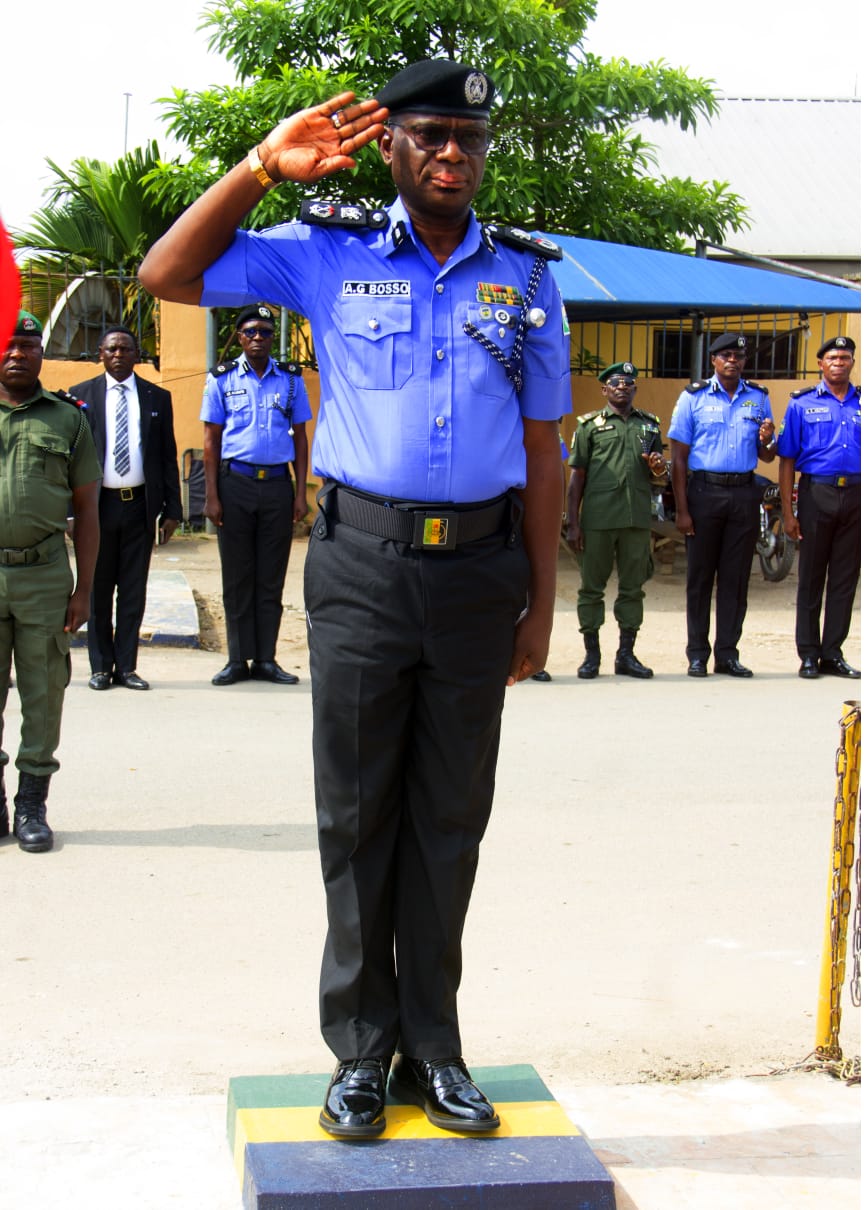
The Imo State Police Command, Owerri, has a new Police Commissioner in the person of Audu Garba Bosso, who replaced Aboki Danjuma, the outgoing Police Commissioner. Danjuma was recently promoted to the rank of Assistant Inspector General of Police (AIG) and posted to Force Headquarters, Abuja.
Upon assumption of duty, CP Bosso called on sister security agencies, stakeholders, and all residents to collaborate with the police in tackling crime and social vices.
He stressed that community-based policing, intelligence-led operations, and a people-friendly approach will guide his administration, with strict adherence to the rule of law and respect for human rights.
In a brief biography made available to journalists by the Command’s spokesperson, Henry Okoye, it was revealed that CP Bosso was born on December 31, 1967, in Bosso, Niger State.
He enlisted into the Nigeria Police Force on June 10, 1994, as a Cadet ASP, Course 18/1994.
Revealing his academic history, Okoye stated that CP Bosso holds an NCE in Geography/Biology, a B.Sc.Ed in Biology, and an M.Sc in Law Enforcement and Criminal Justice from Ahmadu Bello University, Zaria. He is also a member of the National Institute of Policing Studies (MNIPS).
In the course of his career, he has attended key professional courses, including PMF Mobile Training School, Citizenship and Leadership Course, Community Policing Course, TLCC, and SLCC, which have shaped his strategic and community-oriented policing philosophy.
The command’s spokesperson added that before his recent deployment to Imo State, CP Bosso served as DPO in over twenty-two divisions nationwide across Sokoto and Kwara State Commands, including Bale Gudu, Dange-Shuni, Wamako, and Kebbe Divisions in Sokoto State, as well as ‘B’ Division, Surulere, Ilorin, Kwara State Command, among others.
“He also held strategic appointments across several state commands, which include: CSP Administration, Kwara State Command; 2i/c Ilorin Metro Area Command, Kwara; 2i/c CID, Katsina State Command; AC Provost Marshal, Force Headquarters, Abuja; Area Commander, Saki, Oyo State Command; Area Commander, Ikere-Ekiti, Ekiti State Command; ACP Administration, Enugu State Command; Area Commander, Iyekogba, Edo State Command; Director CPTU, Police Service Commission, Jos; Director Finance & Administration, POLAC Wudil, Kano State; DCP G.I FCID Annex, Gombe State; DCP Operations, Borno State Command; and CP G.I FCID Annex, Kaduna State, before his posting to Imo State,” Okoye stated.
The new Commissioner has called on all Imo residents to actively partner with the Police and other security agencies through timely information sharing and participation in community policing initiatives, assuring the public of his commitment to protecting lives and property, maintaining peace, and fostering a people-friendly policing culture across the state.
News
After Bitten To De@th By Snake, Another Snake Reportedly Found Under Ambulance Carrying Nanyah’s Remains Back Home

A London-based teacher and culture ambassador, Uche Nworah, has shared a shocking incident that reportedly occurred while the remains of late singer Ifunanya Nwangene popularly known as Nanyah, were being transported to Enugu.
Nworah, who claims to have been Facebook friends with Ifunanya’s uncle for years, revealed details he says were shared directly by her uncle during a phone conversation.
Contrary to earlier reports circulating on social media, Nworah clarified that Ifunanya did not reside on the ground floor of her Abuja apartment but on the second floor.
This, he noted, raises questions about how snakes could have accessed her living space, as ground-floor access via drains or toilets would not apply.
According to Nworah, the ambulance carrying Ifunanya’s body broke down while en route to Enugu, in line with her father’s wishes.
The breakdown caused a delay as a replacement vehicle had to be called to continue the transport.
While waiting for the replacement ambulance, a snake was reportedly found under the broken-down vehicle.
Sharing the uncle’s account on Facebook, Nworah wrote:
“…Beyond social media claims, I received a call from Ifunanya’s uncle, who has been my Facebook friend for many years. During our conversation, he made disclosures that some may consider disturbing, while others may view them as mere coincidences.
He stated that contrary to widespread reports on social media, Ifunanya did not live on the ground floor of her residence but on the second floor. This raises questions about how snakes could have gained access to her apartment. Had she lived on the ground floor, one might argue that the snakes entered through drainage systems or toilets, but this explanation appears less straightforward given that she lived on the second floor.
He further recounted a strange incident that occurred while her body was being transported to Enugu State in an ambulance, in accordance with her father’s wishes. According to him, the ambulance conveying her remains broke down along the Abuja Expressway, necessitating calling for a replacement vehicle. During the wait he said, a snake was discovered beneath the broken-down ambulance and was subsequently killed.
While these incidents may be entirely unrelated and purely coincidental, they nonetheless raise questions and leave room for reflection.”
The revelation has sparked discussion online, with many questioning the unusual events surrounding the singer’s death.
See below;
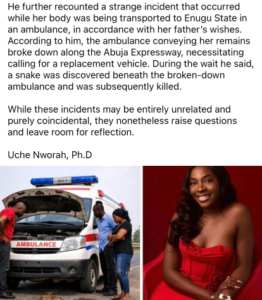
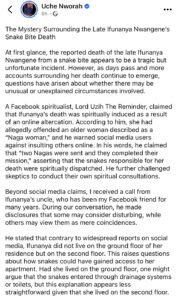
Screenshot
News
FMINO PRESS RELEASE: CAC AT 35 YEARS HAS BECOME A PILLAR OF NIGERIA’S ECONOMIC CREDIBILITY – INFORMATION MINISTER
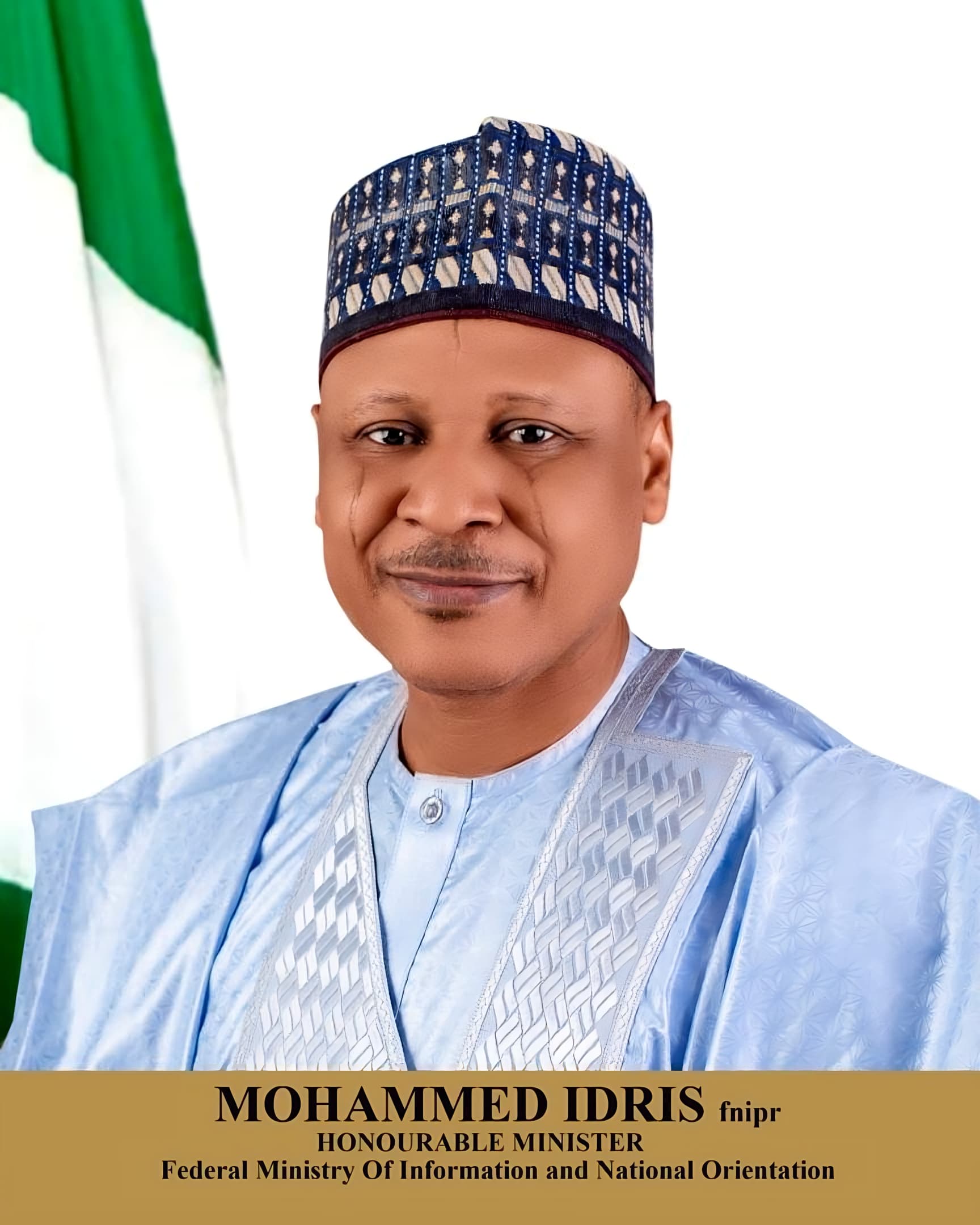
The Honourable Minister of Information and National Orientation, Mohammed Idris, has reaffirmed the Federal Government’s commitment to transparency, institutional reform, and ease of doing business, describing effective inter-agency collaboration as critical to the success of President Bola Ahmed Tinubu’s Renewed Hope Agenda.
The Minister made this known while receiving the Registrar-General and Chief Executive Officer of the Corporate Affairs Commission (CAC), Hussaini Ishaq Magaji, SAN, who led the delegation of the Commission on a courtesy visit to the Ministry ahead of the Commission’s 35th anniversary celebration (CAC@35).
Idris commended the Corporate Affairs Commission for what he described as remarkable institutional reforms that have repositioned the Commission as “a key driver of Nigeria’s business environment and economic credibility.” He noted that CAC’s transformation, particularly through technology and digitisation, aligns strongly with the Federal Government’s broader reform agenda.
The Minister praised CAC’s role in improving the ease of doing business, strengthening corporate governance, and enhancing investor confidence, stressing that such reforms are vital to national development. He also acknowledged the Commission’s contribution to Nigeria’s recent delisting from the Financial Action Task Force (FATF) grey list, describing it as a major milestone that reflects growing global confidence in Nigeria’s regulatory and transparency frameworks.
According to him, the progress recorded under the Tinubu administration, including rising foreign reserves, easing inflation, improved investor confidence, and economic stabilisation, cannot be fully told without recognising the role of reform-driven institutions such as the Corporate Affairs Commission.
The Minister further encouraged CAC to intensify public engagement and advocacy to ensure Nigerians are fully informed about the Commission’s innovations, services, and achievements. He assured the Commission of the Ministry’s support in amplifying its reforms and programmes through strategic communication and public enlightenment.
Earlier, the Registrar-General of CAC, Hussaini Ishaq Magaji, SAN, said the courtesy visit was to formally invite the Honourable Minister to the Commission’s 35th anniversary celebration and to present a scorecard of reforms achieved under the current administration.
He explained that CAC has transitioned from a largely manual, location-bound registry to a fully digital, technology-driven institution, with services now accessible in real time from anywhere in the country. He disclosed that the Commission has expanded its digital offerings from 33 services to over 100 online services, deployed artificial intelligence for business name reservation and registration, and introduced Application Programming Interface (API) services to support banks, embassies, security agencies, and other institutions.
The Registrar-General highlighted the operationalisation of the Beneficial Ownership Register, noting that it has strengthened transparency, boosted investor confidence, and positioned Nigeria as a global reference point for corporate disclosure. He added that CAC’s reforms have helped bring over four million informal businesses into the tax net, improved security by registering POS operators, and supported small and medium-scale enterprises through free business registrations in partnership with relevant agencies.
He also announced the Commission’s upcoming partnership with Google to further strengthen its digital infrastructure and service delivery, as well as the launch of an AI-powered public support platform to guide users on corporate and regulatory matters.
He thanked the Honourable Minister for the warm reception and support, and formally invited him to the CAC@35 anniversary celebration scheduled for February 9, 2026.
The event was attended by the Permanent Secretary of Information and National Orientation, Mr Ogbodo Chinasa Nnam, Director National Archives, Dr. Evelyn Odigboh, Director Public Relations and Protocol, Dr. Haruna Suleiman, and the Special Assistant, Administration to the Honourable Minister, Dr. Sunday Baba, fnipr.
Rabiu Ibrahim
Special Assistant (Media) to the Honourable Minister of Information and National Orientation.
Wednesday, February 4, 2026
-
Business1 year ago
US court acquits Air Peace boss, slams Mayfield $4000 fine
-

 Trending1 year ago
Trending1 year agoNYA demands release of ‘abducted’ Imo chairman, preaches good governance
-

 Politics1 year ago
Politics1 year agoMexico’s new president causes concern just weeks before the US elections
-

 Politics1 year ago
Politics1 year agoPutin invites 20 world leaders
-

 Politics1 year ago
Politics1 year agoRussia bans imports of agro-products from Kazakhstan after refusal to join BRICS
-
Entertainment1 year ago
Bobrisky falls ill in police custody, rushed to hospital
-
Entertainment1 year ago
Bobrisky transferred from Immigration to FCID, spends night behind bars
-
Education1 year ago
GOVERNOR FUBARA APPOINTS COUNCIL MEMBERS FOR KEN SARO-WIWA POLYTECHNIC BORI









